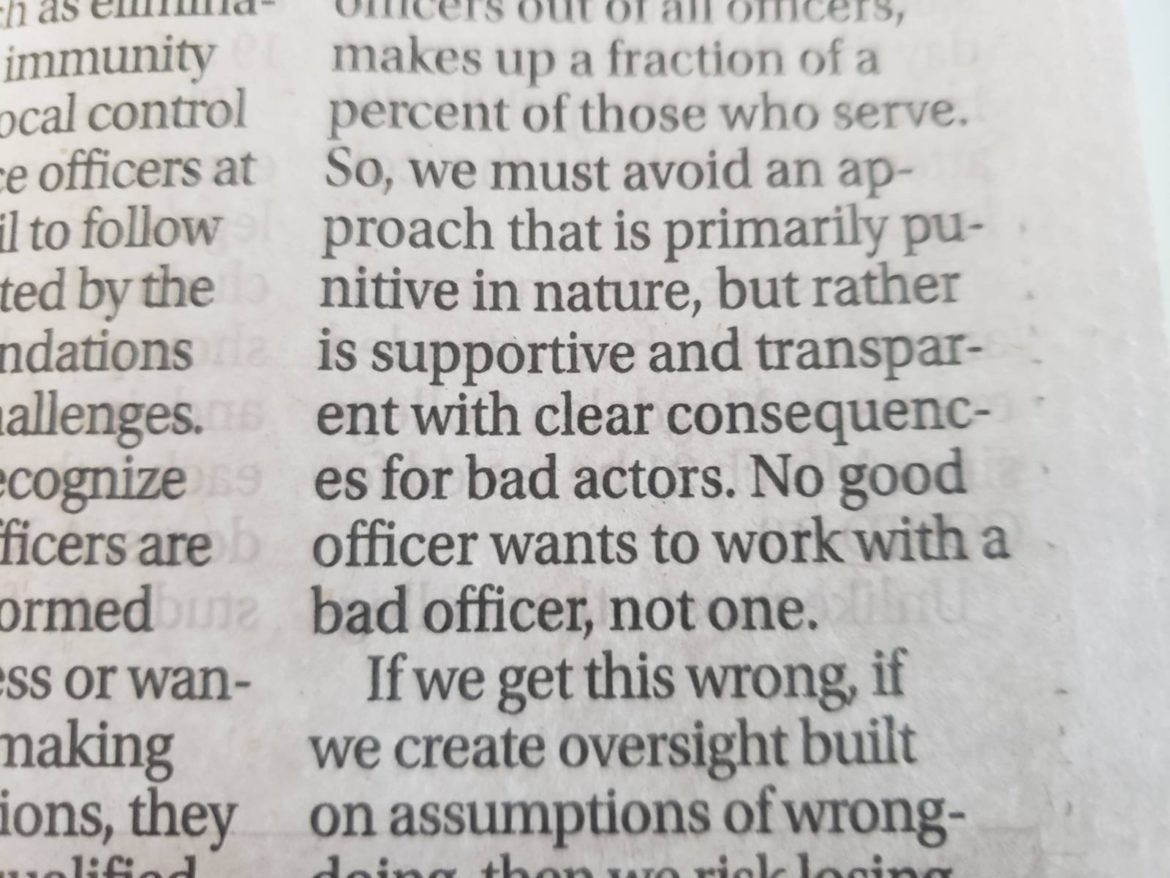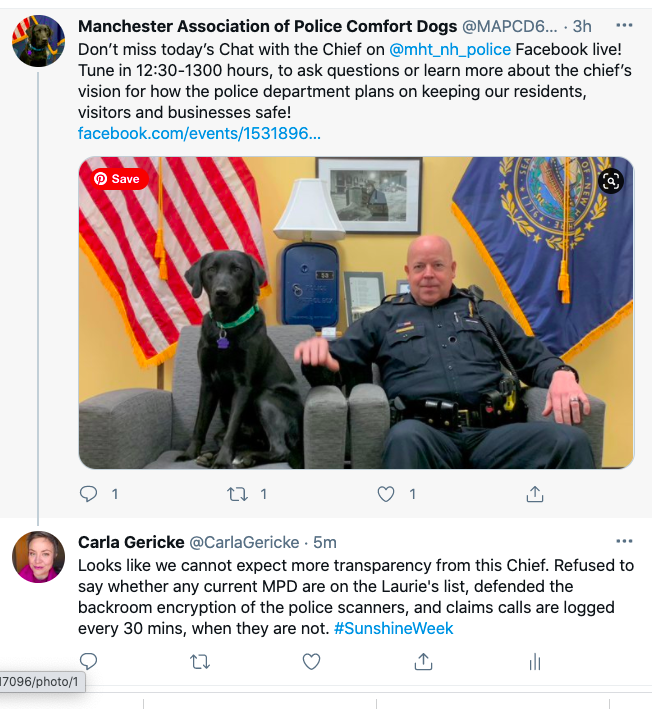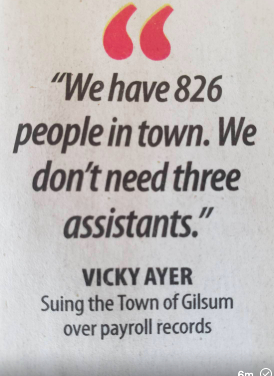This week, we discuss the problems with police body cam footage being exempt from NH’s Right-to-Know laws, the mess with the charter school commission, and more!
Open Government
Just so you know… today the FDA’s acting commissioner Janet Woodcock approved the Pfizer vaccine before the originally slated clinical trial timeframe was completed. She also approved the promotion of OxyContin for 11 year olds a while back. You know, oxys… The thing that helped cause the opioid epidemic. Trust her at your own and at your children’s peril…
“In its opioid decision-making, Dr Woodcock, and the division she supervised, consistently put the interests of opioid manufacturers ahead of public health, often overruling its own scientific advisors and ignoring the pleas of public health groups, state Attorneys General, and outraged victims of the opioid crisis,” the letter said…The letter accused Woodcock of “dereliction of duty” for allowing opioid manufacturers to spend years disseminating false claims that narcotic painkillers were less addictive and more effective than they really were, contributing to the rise of mass opioid prescribing and spread of an epidemic that has claimed more than 500,000 lives.”
SOURCE for quotes: https://www.theguardian.com/…/fda-janet-woodcock…
SOURCE for screen shot: https://en.wikipedia.org/wiki/Janet_Woodcock
It’s 4/20! We chat about the double standard between how citizens and police are treated when someone is fatally shot, what’s the latest on the secret list of bad cops (aka the Laurie’s List), the end of the governor’s mask mandate, and more! You can read more about why I’m excited about 4/20 HERE.
If YOU haven’t watch this video, do eeeeeeet!!! Yes, it’s two years old, but it’s by far the most personally meaningful video I’ve made, touching on all my core issues: liberty > security; privacy and transparency; police accountability and resisting an authoritarian police state; vices are not crimes; and keeping NH awesome!
The issues are fresh af, and after 2020, I think civil libertarians agree, we WILL NOT give up our rights to scared, conditioned, passively obedient, non-thinking people. Sorry.
In this clip, near the end after I ask the genuine question, “When you watch The Matrix, who do you root for? Because in real life, too many people are rooting for Agent Smith!”, I talk about the evolution of signs I have personally made in my dozen+ years of liberty activism in the Free State of NH:
Don’t taze me, bro
Don’t tax me, bro
Don’t lock me down, bro
Don’t spy on me, bro
Don’t teargas me, bro
Now, sadly, I’ll have to add these:
DON’T LOCK ME DOWN, BIG BRO
DON’T VAXX ME, BIG BRO and…
YOU DON’T OWN MY PIE-HOLE, KAREN
Never miss another awesome post by subscribing to my RSS feed at The Art of Independence, my blog: https://www.carlagericke.com/feed/
Subscribe to my new censor-proof channel (not loading here, so I used the YT version): https://odysee.com/@CarlaGericke:c
Follow me on Twitter: https://twitter.com/CarlaGericke
Buy my book, The Ecstatic Pessimist: https://www.amazon.com/Ecstatic-Pessimist…/dp/B087XWGSFN
Nothing screams INTEGRITY like Sununu’s proposed appointment of a judge, Patricia Conway, who in 2015 was involved in having her husband removed from the Laurie’s List, followed by a firing of the whistleblower who made that public, which then lead to a $80,000 settlement that taxpayers had to foot. But it seems entirely plausible, that, as they claimed at the time, the removal of her husband from the secret list of bad cops was like, totes, “an error.”
But y’all keep believing this cabal in 2021 when they say, “So we must avoid an approach that is primarily punitive in nature, but rather is supportive and transparent with clear consequences for bad actors. No good officer wants to work with a bad officer, not one.” (From today’s Union Leader op-ed, “We are all in this together” by Charlie Dennis, Mark Morrison, and Marc Beaudoin.)
If ya’ll are “good cops,” trying to “put your best foot forward,” why HAS NO ONE LEAKED THE LAURIE’S LIST? Why do you always testify AGAINST ANY REFORM measures? Y’all are, if you’ll pardon my French: Full. Of. Shit.
Over the course of the past six years, various “police accountability/we’ll do better, we promise, just don’t change anything” commissions, including the most recent 2020 LEACT Commission, made recommendations, none of which actually go anywhere.
And, if you don’t think there’s a problem in NH, did you know in 2017, 25% OF ALL HOMICIDES WERE COPS KILLING CITIZENS? I haven’t run the numbers for 2020 yet, but I’m pretty sure it’s going to be another bumper “justified killing” year! Justified, even when shooting fleeing people in the back.
In the meanwhile, two court decisions including one from the NH Supreme Court last year, have said to release the FULL Laurie’s List, without the redactions that shocked thousands of Granite Staters when it was printed in the Union Leader a few weeks ago. WHERE IS THE LIST, SO-CALLED “GOOD COPS” AND PROSECUTORS?
What can we do?
The best defense citizens have at this stage is to END QUALIFIED IMMUNITY, which is basically a cop’s personal “get out of jail free” card. Know how you’re told “ignorance of the law is no excuse,” well, get this, for the enforcers of the law, IT IS AN ABSOLUTE DEFENSE. Yup, they are held to a LOWER standard than the rest of us. No kidding!
Your legislators will be voting on HB 111 to END qualified immunity sometime over the next 3 days. I’ve heard due to support from liberty folks and Democrats, it will pass the House. We then need to keep the pressure on the Senate. Stay tuned!
You CAN Fight City Hall and Laurie Is Proof Positive! (Manch Talk 03/30/21)
This week on Manch Talk, I am joined by Right-to-Know open government activist, Laurie Ortolano from Nashua. Laurie takes us through an in-depth look at her case to make sure Nashua City Hall and the tax assessors office are functioning properly in an open, accessible, accountable and responsive way. (Psst: Guess what? They’re not, and she and other activists have been arrested to prove it!) (Double psst: What do you call it when the Mayor in a town gets special tax treatment?)
The Free State is THAT “Cool Little Planet,” And PorcFest is YOUR Landing Pad
If you’re a #LIBERTARIAN, you should come to PorcFest 2021 (XVIII) because we’re about to enter into Totalitarian Empire Time, and the Free State of NH is well-positioned to become that one “cool little planet where everyone stops to trade, fix their space ship, and hire a mercenary.” You know the one, that free market, low-key spot where everyone gets along because they don’t give a shit beyond *trading* for what they want!
If you’re putting a village together for PorcFest (which is sort of the mini-version of this planet) please, invite me to speak to your peeps. I have a lot to say! Buy your $50 tickets for Dave Smith, Tom Woods, Dr Naomi Wolf, Matt Kibbe and more today! Get them soon, because we’ve sold a record amount of tickets and we may have to cap attendance! You. Have. Been. Warned.
A bit about me and my skills and 25+ years of experience as an author, activist, and attorney. My mantra is #LiveFreeAndThrive! My subjects:
* Independence/secession/”Yankee Hong Kong”
* ReOpen/ReBuild NH activities/critic of lockdown and Covid response
* Free State Project: I have been actively involved since I first organized PorcFest in 2009 and am the only person to have done it x3 including in 2020 like a mofo libertarian HERO!!! ![]() , I was the president from 2010-2016, got Edward Snowden, triggered the move, and now serve as Chair of the board
, I was the president from 2010-2016, got Edward Snowden, triggered the move, and now serve as Chair of the board
* Police accountability/qualified immunity, including a deep understanding of NH’s secret Laurie’s List, I’m an active and outspoken critic of police militarization, incl. BEARCATS, police radio encryption, drones, and unlawful surveillance cameras (lost my 2019 lawsuit, boo!)
* First Amendment/free speech, including winning my 2014 landmark and well-cited 1st Circuit First Amendment case affirming the right to film police encounters in public, Gericke vs. Begin et al
* Right-to-Know/NH Open Government, incl. court cases like Brady, Fenniman, Keene 5, etc. Suggested getting redacted Laurie’s List printed in the newspaper for Sunshine Week 2021
* “Art as Activism,” including teaching writing skills (I have an MFA in creative writing in addition to my law degree) and my book The Ecstatic Pessimist (which everyone should buy on Amazon!!! It includes 13 essays about my NH activism and the FSP)
* Politics and running for NH Senate x3 as an unabashed Free Stater and getting 45% in 2020, see Carla Gericke for New Hampshire
* “Liberty as a Lifestyle,” so how to improve your health, diet, fasting, keto, yoga, sleep, cooking from scratch, and my own transformation including losing and keeping off 65 lbs and living alcohol-free.
Learn more: https://www.carlagericke.com/about/
As the government asserts more and more control over every aspect of your life, going so far as to unlawfully claim they have the right to tell you what face coverings to wear in public, our NH police become less and less transparent.
They spy on us with ill-gotten surveillance cameras, but hide their actions from us. Does this sound right to you?
Traditionally, in Manchester, we had access to the police scanners. This was a simple way for the press and public to exercise some oversight over police actions on our streets, and to know when militarized tools like the BEARCAT was deployed. Around 2016, Chief Willard, in a backroom deal with the City, simply encrypted the scanners. NO PUBLIC INPUT/HEARING WAS HELD.
Today, since it is #SunshineWeek, and I serve on Right-to-Know NH, a statewide nonpartisan coalition of open government advocates, I asked Chief Aldenberg about how he will approach MPD transparency.
The Chief refused to answer whether any active MPD are on the current redacted Laurie’s List/EES. The NH Supreme Court overruled Fenniman last year, and the “personnel record” exception no longer applies. Nor, frankly, should it ever be permissible, in a functioning open society, for state agents, especially those permitted to use lethal force, to hide their own bad behavior from citizens. Watch this week’s episode of Manch Talk for a primer on the Laurie’s List, the court cases, and where we currently stand.
When asked about the dark scanners, the Chief suggested “that’s just how it is.” Chief, you have an opportunity to reverse course on this issue, and be more open and transparent. Please consider this.
The Chief also incorrectly stated the police log is updated every 30 minutes. It’s not. AND, not all calls are logged. Why’s that?
If the police log online is now the public’s sole “check and balance,” what reassurances do we have about the veracity or timeliness of the information on the log? How can we exercise any oversight? Is this how you establish trust? I think we can do better…
Please consider your duty and oath to the NH Constitution:
[Art.] 8. [Accountability of Magistrates and Officers; Public’s Right to Know.] All power residing originally in, and being derived from, the people, all the magistrates and officers of government are their substitutes and agents, and at all times accountable to them. Government, therefore, should be open, accessible, accountable and responsive. To that end, the public’s right of access to governmental proceedings and records shall not be unreasonably restricted. The public also has a right to an orderly, lawful, and accountable government…
ACCOUNTABLE AND RESPONSIVE.
Thanks for doing the Q&A, Manchester NH Police. I look forward to seeing us make progress on these issues to improve citizens’ oversight of your department.
If Only There Was a Way to Tell Who the Bad Cops Are… Oh, Wait… (Manch Talk 03/16/21)
In honor of Sunshine Week, this Sunday, the Union Leader printed the entire redacted Laurie’s List to show Granite Staters the shocking number cops with “sustained findings of misconduct” being hidden from public view. We discuss your Constitutionally-protected Right-to-Know, recent court successes, and suspicious rollbacks being attempted at the State House. Tune in to learn more!
Learn more about this issue:
Open government
Government accountability
Small NH Town Gets Sued Under Right-to-Know For Refusing to Tell Townsfolk How Much They Are Paying Themselves
Vicky Ayer of Gillsum is fighting back! She is a member of Right-to-Know NH, a nonpartisan group of concerned open government advocates. See links below to get involved.
From today’s Union Leader:
“Gilsum is a town of about 800 people with an annual operating budget of about $600,000, but according to resident Vicky Ayer, a good portion of that budget is shrouded in mystery.
‘We have no clue where some of our money goes,’ Ayer said.
The town spends about $200,000 a year in salaries, and another $80,000 for employee health insurance. Ayer has been trying for years to get the board to include details on the expenditures in the annual town report to no avail. The money spent is taxpayer money, and ought to be public, she said.
‘We don’t know who gets what and where it goes,’ Ayer said.
For example, Ayer said the town refuses to disclose how much it pays to the part-time administrative assistant, Robin Cantara, Cantara’s assistant, or the new assistant who also joined the town this year.
‘We have 826 people in town. We don’t need three assistants,’ Ayer said.
Cantara did not answer the phone listed on the town website on Tuesday. Cantara is also the town’s clerk and tax collector.
Selectmen have claimed they legally do not have to disclose the salary information for town employees under the state’s Right-to-Know Law, according to Ayer’s lawsuit. That’s in contradiction with the Attorney General’s most recent memoranda on the Right-to-Know Law, which clearly lists salary for public employees as a public matter. Ayer claims she was told by selectmen they had a legal opinion advising them not to disclose the information in the town’s annual report.
Ayer filed a Right-to-Know lawsuit against the town seeking to get a copy of that opinion along with other information. The town’s attorney, Gary Kinyon, argues in court documents that selectmen do not have to hand over any opinion received from town counsel. Kinyon did not respond to a request for comment. Select Board Chair Timothy May could not be reached.
Ayer said Cheshire County Superior Court Judge David Ruoff is now giving board members 10 days to come up with the legal opinion they claim allows them not to disclose all of the town’s finances.
‘It will be interesting to see what they produce,’ Ayer said.”
Learn more about Right-to-Know NH. We meet on the third Saturday of every month, and welcome new members to join our ranks. Get involved!
Interested in filing your own RTK request? It’s surprisingly easy! Follow this handy guide!






